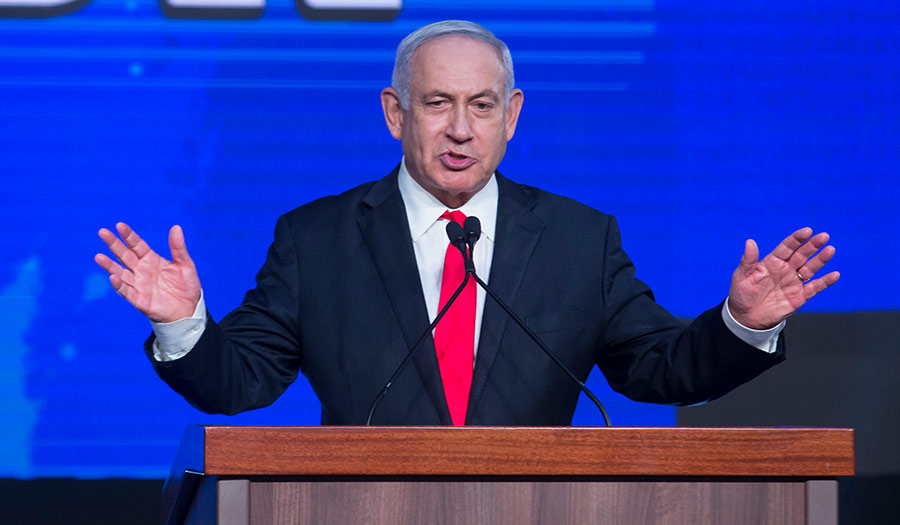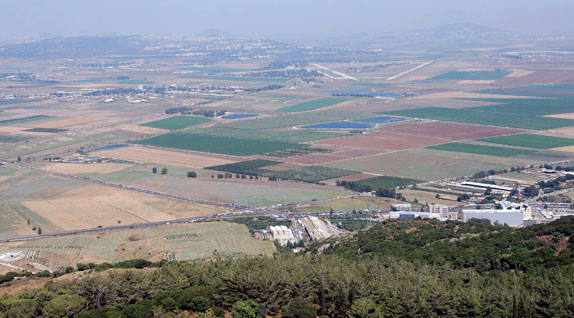 Amir Levy/Getty Images
Amir Levy/Getty Images
Israeli Prime Minister Benjamin Netanyahu speaks at a post-election event in Jerusalem (March 24, 2021).
Subscribe to the Real Truth for FREE news and analysis.
Subscribe NowJERUSALEM (Reuters) – Prime Minister Benjamin Netanyahu’s prospects for another term looked uncertain on Wednesday after partial results from Israel’s fourth national election in two years projected no clear path to victory.
The right-wing bloc led by Mr. Netanyahu’s Likud party had a slight edge but was in a tight race with a grouping of center, left and right-wing parties looking to unseat him.
Who Are the Main Players?
Mr. Netanyahu campaigned on Israel’s world-beating COVID-19 vaccine rollout, but such is the polarization in Israeli politics that even this could not break the stalemate.
Critics accuse him of mismanaging pandemic lockdowns that have hit Israel’s economy hard and also point to corruption allegations. He denies any wrongdoing.
His party looks set to lose around six seats—falling to around 30 in Israel’s 120-seat parliament—making him more reliant on right-wing rivals.
They will demand concessions during coalition horse-trading, and will ultimately be looking to replace him as standard-bearer of the right.
Yair Lapid is a former finance minister and TV host who leads the center-left party Yesh Atid—“There is a Future.”
His party is predicted to come second, with around 18 seats.
Lapid campaigned to “bring sanity” back to Israel with clean government and moderate leadership.
But he faces an even harder task—uniting disparate parties from across the political spectrum. They all want to see Mr. Netanyahu removed, but are not obvious partners.
Naftali Bennett is a former Netanyahu aide, defense minister and high-tech millionaire who heads the ultra-hawkish Yamina party and is vying to be the next leader of the Israeli right.
Though his party is predicted to grow slightly to seven seats, Mr. Bennett has positioned himself as a kingmaker, refusing to commit to Mr. Netanyahu or against him.
Gideon Saar is a former cabinet minister who quit Likud to set up the New Hope party, vowing to end Mr. Netanyahu’s reign.
Like Likud, his party opposes Palestinian statehood. Mr. Saar’s campaign centered on clean government and jump-starting the economy but is expected to land only six seats.
He could help unite factions from left and right. But Mr. Netanyahu will probably urge disappointed New Hope members to defect back ‘home’ to Likud.
Bezalel Smotrich heads the far-right Religious Zionism party, which is projected to win around six seats.
It includes Itamar Ben-Gvir, a former activist with the now-outlawed Kach movement, which advocated that Israel expel Arabs. It also includes a member of the Noam movement, which opposes LGBT rights and recognition of non-Orthodox Judaism in Israel.
The party includes hardline Jewish settlers among its base, and rejects any territorial concessions to the Palestinians.
Mansour Abbas, an Islamist forecast to win six seats, has shaken the Arab political establishment by floating the idea of working with Mr. Netanyahu’s right-wing government to address violence and other social issues in Arab towns.
No Arab party has ever joined a ruling Israeli coalition, and Mr. Abbas’s proposal is rejected by most Arab voters, many of whom identify with Palestinians in the West Bank and Gaza. It remains an unlikely alliance of opposites.
The divisions within Israel’s 21 percent Arab minority look set to push overall Arab representation down.
When Are the Results?
The final tally is expected by Friday. A party must pass a threshold of 3.25 percent of the votes to enter parliament. Around 12 parties have a realistic chance of qualifying.
What Happens After the Results Are Published?
Israel’s president, Reuven Rivlin, will consult with party leaders about who they want as prime minister. By April 7 he is expected to choose the legislator with the best chance.
That nominee has up to 42 days to form a government. Then the president asks others to try.
If nobody succeeds, Israel goes to a fifth election.
 The Nation-state of Israel – Understanding Its True Biblical Identity
The Nation-state of Israel – Understanding Its True Biblical Identity